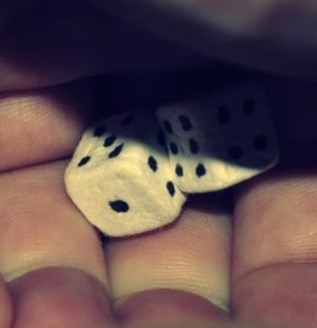It’s fortunate that Wizards of the Coast can’t keep it in their metaphorical pants and keeps trying to go for all of the money in the most obnoxiously predatory ways and has done so since at least 4th edition and its attempt at a virtual tabletop monopoly and “blind bag” miniature peddling.
I need to train myself to stop saying “D&D” for tabletop fantasy games because I am not going back again. I left before, and this time it’s permanent. Fuck WOTC. 


Thanks comrade! Picked em specifically for being fairly forgiving to run, compared to DnD or something so rules-light I have to come up with everything myself.
deleted by creator
My party convinced themselves during an arson investigaon that the culprit was a werebeaver, and now the culprit is a werebeaver
deleted by creator
Ohhh, thanks! Beneficial gaslighting, haha. Will keep those in mind!
Sortof, but I think of it more as a part of the cooperative storytelling element. Players figuring out puzzles or locations or how things make sense can offer a better idea than you had originally - and even if not “better” they’re their ideas and therefore automatically more engaging. Them not being overtly made aware that they’re shaping the story in that way is, I think, good for immersion. Though there are some popular games that make that kind of interaction an acknowledged part of the game mechanics, I just haven’t really explored those myself.
All adventures and plots and whatnot could be drawn out as a vast and total map of every possible option (megadungeons be crazy), but any particular group will only ever take one of those possible paths (well, megadungeons be crazy). It’s an immense saving in mental energy to not have to juggle a dozen different options, and put some of that saving into making fewer, better, events.
Going “left” or “right” and them leading to the same event isn’t really deceptive, it’s part of a relationship where the GM manages narrative flow to enable players to play around with an interesting subset of that vast and intimidating space where “you can do anything” - and it isn’t really a railroad unless they’re then prevented from going back and choosing the other direction. I’ve had my group get ten minutes into a dungeon, find a few neat bits of loot and then just… lose interest in it and go track down the flying city that made the items because I was a fool and gave them a more interesting origin - ended up pretty neat.
Though this is all informed by my style of mostly winging it and how my group plays. I make a small network of elements in play and how they interact and then adjust things on-the-fly. I ignore things that my group aren’t interested in (random encounters, encumbrance, various rules), no longer expect them to slog through twenty rooms in a crypt, and I make quiet notes of any random comments that indicate a desire for something to happen later so that I can include an opportunity for it.
deleted by creator
Technically? But it’s for everyone’s fun and nobody needs to see behind the Warden’s screen 😈
deleted by creator
I roll in the open, let chaos reign!
deleted by creator
Will do 🫡
deleted by creator
My take on that is that if the narrative space is fuzzy enough to allow that, it shouldn’t be granular enough that the players are blindly deciding left or right in the first place. Like I learned from experience that it’s better to let someone roll a skill check to get clearer options like “find a lower level” or “track their quarry” or “opportunistically loot” and just do some PbtA style complications in the background, instead of trying to make a real map of a narrative space and letting the players flounder about trying to guess where I intended them to go.
Of course I swung pretty hard towards “let the player character’s skills and dice decide what opportunities they have” in general, alongside just collaboratively riffing on plot points with them to decide what the macguffin they’re chasing that week is and what their opposition is when I didn’t have a good idea otherwise. Especially because that tended to make things funny and lighthearted, while my own ideas veered into psychological and body horror entirely by chance, like whenever I was writing the stories they’d just get real dark and real fucked up really fast instead of being shitposts where my shadowrun players decided the genetailored pet they’ve been hired to steal is a pikachu and they start calling themselves Team Rocket and quoting old pokemon episodes.